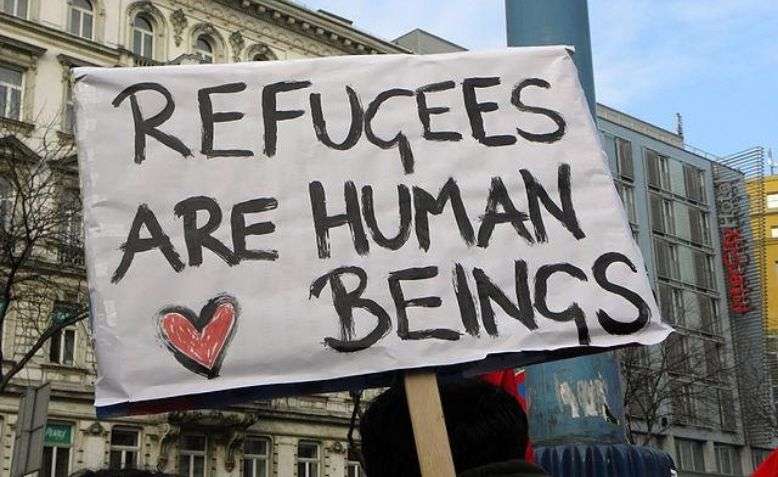 Refugee solidarity march. Photo: Haeferl / Wikimedia Commons / cropped original image / licensed under CC 4.0, linked at bottom of article
Refugee solidarity march. Photo: Haeferl / Wikimedia Commons / cropped original image / licensed under CC 4.0, linked at bottom of article
‘Wars are welcome, refugees not’ seems to be the only mantra the media and politicians want to repeat, says Lindsey German
There is something particularly sickening about the condemnation from right wing politicians and their media counterparts of those arriving on Britain’s coast to claim asylum. The refugees now embarking on dangerous journeys to cross the English Channel have crossed half a world to try to reach safety. They come in large part from the Middle East and from Afghanistan, in their majority victims of the wars waged in those countries, wars in which Britain has played a central part.
More than that, the media and politicians now denouncing them – and demanding that military force is deployed to deter them – are, almost to a man and woman, the same people who cheered those wars, claiming that they would improve the lives of exactly those people who now attempt this dangerous journey in rubber dinghies. It was a lie then and it remains a lie now.
Instead of reporting the disastrous situations in Afghanistan, Iraq and Libya – all of them countries where regime change was effected by Britain, along with its allies – instead we are presented with a news story which suggests that these refugees have nothing to do with Britain. These countries are the main starting points for the bulk of those seeking asylum, along with Syria, where Britain has also intervened.
Wars, airstrikes, interventions and the beginning of occupations are covered in breathless detail, boosted by Ministry of Defence press handouts and endless interviews with military figures. But after the regime is changed, much less is heard – for understandable reasons because things do not get better, but worse. In Libya, civil war continues. The situation in Iraq is still dangerous and unstable, nearly two decades after the war. Afghanistan, which was invaded 19 years ago, remains one of the poorest and most dangerous countries to live in anywhere in the world.
This coming week, ‘peace talks’ are taking place in Doha between the Afghan government and the Taliban, the organisation overthrown by the invasion all those years ago. To facilitate these talks, the government has agreed to the release of a further 400 Taliban prisoners, bringing those released in total to 5000. This is part of a deal made between the US government and the Taliban earlier this year, which supposedly is to lead to the withdrawal of US troops – something promised by both Obama and Trump, but which has still not happened.
The deal begs the question of why it was necessary to go through so many years of war and occupation in order to end up in a similar place to 2001. To answer that would pose far too much of a challenge to the BBC and the rest of the media, let alone the politicians who continue to defend these barbaric actions.
There are three major legacies of Britain’s 21st century interventions:
- The terrible destabilisation of a whole range of countries which, whatever their failings before, are in a worse state since western powers invaded or bombed them.
- The growth of terrorism, and especially the rise of ISIS – formed in an Iraqi prison in the British-controlled south, and which now exists in a number of countries across the world.
- The creation of millions of refugees, who have lost homes and livelihoods through war, resulting environmental destruction and widespread instability. Most refugees do not get very far – they are in Pakistan, Jordan, and other countries neighbouring the war zones. Only a minority get to Europe.
These legacies are the responsibility of countries like Britain. In any civilised country those who justify and perpetrate these wars should also have to be held accountable for them. The costs of welcoming and caring for these refugees are minimal compared to the costs of even a very short war. If we are to use navy boats it should be to protect them, not to force them back.
And their arrival should not be the cause of outrage and furore but the basis for an examination of why those wars were wrong and how we can end them.
This article was originally published with Stop The War
Before you go
Counterfire is growing faster than ever before
We need to raise £20,000 as we are having to expand operations. We are moving to a bigger, better central office, upping our print run and distribution, buying a new printer, new computers and employing more staff.

